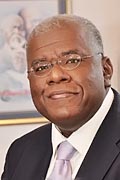Latest News Archive
Please select Category, Year, and then Month to display items
12 January 2024
|
Story Nonsindiswe Qwabe
|
Photo Sonia Small
 Since joining the UFS in 2008, Dr Grey Magaiza has worked extensively on approaches that can foster the socio-economic transformation of societies.
Since joining the UFS in 2008, Dr Grey Magaiza has worked extensively on approaches that can foster the socio-economic transformation of societies.
“The future should be one where communities can decide on their development agenda and futures. That’s the most important for me.” Dr Grey Magaiza, Deputy Director of the Centre for Gender and Africa Studies (CGAS) and Head of the Community Development programme on the Qwaqwa Campus, is passionate about capacitating communities to be agents of change and advancement. His vision for the future emphasises the empowerment of communities to take charge of their development by actively participating in decision making and the implementation of development projects that can improve their lives.
Since joining the UFS in 2008, Dr Magaiza has worked extensively on approaches that can foster the socio-economic transformation of societies. Over the years, he has crafted his research speciality into one that he is most proud of – being an interdisciplinary scientist immersed in the development of communities.
“I’m in a fortunate position of researching what I like. I say ‘fortunate’, because I’ve taken the time to understand what I’m passionate about, which is the overall field of rural livelihoods and livelihood futures – in short, community development. My research starts from an engaged university, understanding the elements that a university must use to enhance transformation and relevance to its immediate community in terms of development.”
One of the ways he has done this is by looking at social entrepreneurship as a development approach for young people in a rural setting. Through workshops with non-profit and civic organisations in Qwaqwa, Dr Magaiza has been helping these organisations to map out their needs and actively meet them through the involvement and support of external role players.
“We understand that communities are part of the national development agenda, but even that national agenda respects community knowledge and intentions and allows communities to shape their identity. A critical enabler of this is community organising. You bring back the capacity in communities to have dialogues on issues affecting them as spaces for engagement, knowledge exchange, and for people to just talk about their way forward.”
By enabling communities to define their development agenda, they can address their specific needs, challenges, and aspirations, he said. “When I look at livelihood futures, it’s quite an exciting aspect of my work – it’s like looking into a fortune tellers’ globe, because you’re not deciding for communities what they should do, but the communities themselves take those decisions.”
Prof. Jonathan Jansen honoured for transforming education
2010-04-16
 |
| Prof. Jonathan Jansen |
|
The Rector and Vice-Chancellor of the University of the Free State (UFS), Prof. Jonathan Jansen, will be awarded an honorary doctorate by the Cleveland State University in the United State of America.
“The Board of Trustees and the Faculty of Cleveland State University have voted to award you this degree in recognition of your outstanding contribution towards the transformation of education, politics and diversity for the citizens and students of South Africa and the world,” Ronald Berkman, President of the Cleveland State University, stated in the letter he wrote to Prof. Jansen.
The degree, an Honorary Doctor of Higher Education Administration, will be conferred on him in Cleveland on 15 May 2010.
Prof. Jansen has also received recognition of another form. His book, Knowledge in the Blood: Confronting Race and the Apartheid Past, was among the six books that were selected for outstanding recognition awards by the American Educational Research Association (AERA), in the category: “Decolonizing the curriculum conversation”.
The book was also listed among the best 31 books of 2009 by the Library Journal - the oldest and most respected publication covering the library field.
The outstanding recognition awards recognize books that make a vital contribution to Curriculum Studies.
The six books were among 30 that were submitted for the Outstanding Book Award won by Peter Taubman’s Teaching by Numbers.
Media Release
Issued by: Mangaliso Radebe
Assistant Director: Media Liaison
Tel: 051 401 2828
Cell: 078 460 3320
E-mail: radebemt@ufs.ac.za
16 April 2010
|